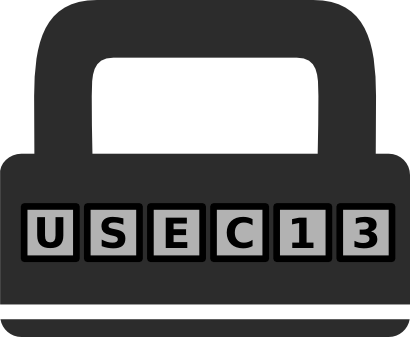
The 2013 Workshop on Usable Security

Networked information systems permeate modern life. From the ATM to the tablet computer, they're ubiquitous, as is increasingly their connectivity to the Internet. Securing these systems is a hard job at the technical level. The socio-technical side adds even more complexity. It is now well-understood that the human side of securing systems is at least as difficult as the technical side. While great strides have been made in making systems usable and technically secure, there is often an inherent contradiction in providing usable security: security is both an emergent property of the system as a whole and for some users/system elements/circumstances the aim of security is explicitly to apply the ultimate opposition of usability: denial of access.
This apparent contradiction underpins this workshop, which brings together researchers from a variety of disciplines including, but not limited to, computer science, psychology, business studies, to present and discuss recent advances in enabling systems to provide more easily usable security and privacy. Highlights of last year's workshop include a linguistic analysis of passphrases (a proposed replacement for passwords), a method of developing privacy-preserving registration databases, a system to advise users on the actual personal information used and transmitted by Android smartphone applications, and a new taxonomy of weaknesses in the human factors of cryptographic protocols.
Submission Site (now available only for updates to accepted papers, via the EasyChair system).
Submission Deadline: 18th December (Extended from 16th November 2012)
Notification of Acceptance: 15th February 2013 (changed from 17th December 2012)
Final Paper Deadline: 12th April 2013 (changed from 12th January 2013)
Workshop: 1st April 2013
Registration will be through the main Financial Crypto and Data Security 2013 conference.
The program is now available, together with draft versions of the papers for each talk.
The accepted papers will also be published in an LNCS volume together with the other workshops attached to the FC '13 conference, in a post-conference proceedings.
Kindly sponsored by Google, Dr Alessandro Acquisti of Heinz College at Carnegie Mellon University will deliver a keynote speech at USEC 13:
Confessions of a Privacy Economist
What drives people to disclose or protect their personal information? What are the tangible and intangible consequences of those decisions? In this talk, I will discuss the transition from the economics to the behavioral economics of privacy. In particular, I will present and contrast a series of opposing "frames," or ways to frame and analyze the privacy debate, using the lenses of behavioral economic research. I will start from frames I have analyzed in my research (for instance: is privacy really about "transparency" and "control"?) and progressively move onto less settled, and perhaps more controversial, frames of the debate.

|
Andrew A. Adams, Centre for Business Information Ethics, Meiji University, Tokyo, Japan (Program Chair) |
|
|
Kiyoshi Murata, Centre for Business Information Ethics, Meiji University, Tokyo, Japan |
Jean Camp, Indiana University
Jim Blythe, University of Southern California
Angela Sasse, UCL
Sadia Afroz, Drexel University
Rainer Böhme, University of Münster
Pam Briggs, Northumbria University
Lorrie Cranor, CMU
Neil Gandal, University of Tel Aviv
Seda Gürses, K.U. Leuven
Peter Gutmann, University of Auckland
Raquel Hill, Indiana University
Tiffany Hyun-Jin Kim, CMU
Markus Jakobsson, PayPal
Timothy Kelley, Indiana University
Brian LaMacchia, Microsoft Research
William Lehr, MIT
Hui Kai Lung, Hong Kong University of Science and Technology
Hitoshi Okada, National Institute of Informatics
Frank Stajano, University of Cambridge
Andrew Patrick, Office of the Privacy Commissioner of Canada
Hovav Schacham, University of California, San Diego
Bruce Schneier, BT
Dan Schutzer, BITS
Sean Smith, Dartmouth College
Douglas Stebila, Queensland University of Technology
David Wagner, University of California, Berkeley
Nicholas Weaver, University of California, Berkeley
Tara Whalen, Carleton University
As noted above, Google are kindly sponsoring the keynote speech by Dr Acquisti.